| Listing 1 - 10 of 26 | << page >> |
Sort by
|
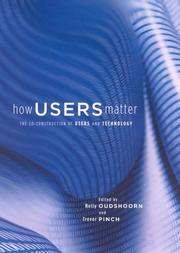
ISBN: 9780262651097 0262151073 9780262151078 0262651092 9780262281119 0262281112 1423730011 9781423730019 Year: 2003 Publisher: Cambridge, Mass. : MIT Press,
Abstract | Keywords | Export | Availability | Bookmark
 Loading...
Loading...Choose an application
- Reference Manager
- EndNote
- RefWorks (Direct export to RefWorks)
Users have become an integral part of technology studies. The essays in this volume look at the creative capacity of users to shape technology in all phases, from design to implementation. Using a variety of theoretical approaches, including a feminist focus on users and use (in place of the traditional emphasis on men and machines), concepts from semiotics, and the cultural studies view of consumption as a cultural activity, these essays examine what users do with technology and, in turn, what technology does to users. The contributors consider how users consume, modify, domesticate, design, reconfigure, and resist technological development--and how users are defined and transformed by technology.The essays in part I show that resistance to and non-use of a technology can be a crucial factor in the eventual modification and improvement of that technology; examples considered include the introduction of the telephone into rural America and the influence of non-users of the Internet. The essays in part II look at advocacy groups and the many kinds of users they represent, particularly in the context of health care and clinical testing. The essays in part III examine the role of users in different phases of the design, testing, and selling of technology. Included here is an enlightening account of one company's design process for men's and women's shavers, which resulted in a "Ladyshave" for users assumed to be technophobes. Taken together, the essays in How Users Matter show that any understanding of users must take into consideration the multiplicity of roles they play--and that the conventional distinction between users and producers is largely artificial.
Technology --- Social aspects --- sociology of knowledge --- Product strategy --- users --- technology --- Social aspects. --- Innovatie. --- Technological innovations --- Innovations --- Technologie --- Aspect social --- technology [general associated concept] --- Technology - Social aspects --- SCIENCE, TECHNOLOGY & SOCIETY/General --- COMPUTER SCIENCE/Human Computer Interaction
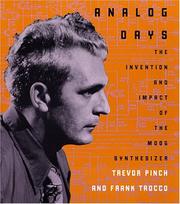
ISBN: 0674042166 9780674042162 9780674016170 0674016173 0674266463 9780674008892 0674008898 Year: 2004 Publisher: Cambridge, Mass. London
Abstract | Keywords | Export | Availability | Bookmark
 Loading...
Loading...Choose an application
- Reference Manager
- EndNote
- RefWorks (Direct export to RefWorks)
Tracing the development of the Moog synthesizer from its initial conception to its ascension to stardom in 'Switched-on Bach', this text conveys the consequences of a technology that would provide the soundtrack for a chapter in cultural history.
Book
ISBN: 0262336553 9780262336550 9780262035279 0262035278 0262336561 Year: 2017 Publisher: Cambridge, MA
Abstract | Keywords | Export | Availability | Bookmark
 Loading...
Loading...Choose an application
- Reference Manager
- EndNote
- RefWorks (Direct export to RefWorks)
Interviews, life history, and theoretical discussions of the first years and later developments of the theory of the Social Construction of Technology in STS, with Trevor Pinch, one of the founding fathers of SCOT--
Human engineering --- Technology --- Ergonomics --- Human factors in engineering design --- Bioengineering --- Environmental engineering --- Industrial engineering --- Human comfort --- Human-robot interaction --- Social aspects --- E-books --- Human engineering. --- Social aspects.

ISBN: 0674016173 Year: 2002 Publisher: Cambridge, Mass. Harvard University Press
Abstract | Keywords | Export | Availability | Bookmark
 Loading...
Loading...Choose an application
- Reference Manager
- EndNote
- RefWorks (Direct export to RefWorks)
Music --- anno 1900-1999 --- 78.48
Book
Abstract | Keywords | Export | Availability | Bookmark
 Loading...
Loading...Choose an application
- Reference Manager
- EndNote
- RefWorks (Direct export to RefWorks)
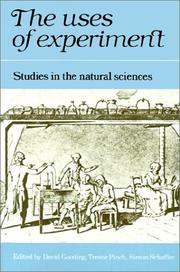
ISBN: 0521337682 0521331854 9780521331852 9780521337687 Year: 1989 Publisher: Cambridge: Cambridge university press,
Abstract | Keywords | Export | Availability | Bookmark
 Loading...
Loading...Choose an application
- Reference Manager
- EndNote
- RefWorks (Direct export to RefWorks)
Philosophy of science --- Science --- Experiments --- Philosophy. --- Methodology --- Case studies. --- -Science --- -Natural science --- Science of science --- Sciences --- -Philosophy --- -Case studies --- -Experiments --- Natural science --- Experiments&delete& --- Philosophy --- Methodology&delete& --- Case studies --- Natural sciences --- Science - Experiments - Philosophy. --- Science - Methodology - Case studies. --- Science-experimentals-philosophy --- Science-methodology-case studies
Book
ISBN: 9780195388947 9780199995813 0195388941 0199995818 Year: 2013 Publisher: New York (N.Y.): Oxford university press,
Abstract | Keywords | Export | Availability | Bookmark
 Loading...
Loading...Choose an application
- Reference Manager
- EndNote
- RefWorks (Direct export to RefWorks)
Written by the world's leading scholars and researchers in the emerging field of sound studies, The Oxford Handbook of Sound Studies offers new and fully engaging perspectives on the significance of sound in its material and cultural forms. The book considers sounds and music as experienced in such diverse settings as shop floors, laboratories, clinics, design studios, homes, and clubs, across an impressively broad range of historical periods and national and cultural contexts. Science has traditionally been understood as a visual matter, a study which has historically been undertaken with optical technologies such as slides, graphs, and telescopes. This book questions that notion powerfully by showing how listening has contributed to scientific practice. Sounds have always been a part of human experience, shaping and transforming the world in which we live in ways that often go unnoticed. Sounds and music, the authors argue, are embedded in the fabric of everyday life, art, commerce, and politics in ways which impact our perception of the world.Through an extraordinarily diverse set of case studies, authors illustrate how sounds - from the sounds of industrialization, to the sounds of automobiles, to sounds in underwater music and hip-hop, to the sounds of nanotechnology - give rise to new forms listening practices. In addition, the book discusses the rise of new public problems such as noise pollution, hearing loss, and the "end" of the amateur musician that stem from the spread and appropriation of new sound- and music-related technologies, analog and digital, in many domains of life. Rich in vivid and detailed examples and compelling case studies, and featuring a companion website of listening samples, this remarkable volume boldly challenges readers to rethink the way they hear and understand the world.
Sound --- Sounds --- Noise --- Acoustics --- Continuum mechanics --- Mathematical physics --- Physics --- Pneumatics --- Radiation --- Wave-motion, Theory of --- Silence --- Sound effects --- Manners and customs --- Son --- Bruit --- Handbooks, manuals, etc --- Guides, manuels, etc --- 78.82 --- 78.83 --- 78.86 --- 781.1 --- Geluid ; geluiden ; klanken --- Sound Art --- Geluidskunst --- Handbooks, manuals, etc. --- Affective and dynamic functions --- Vibrations
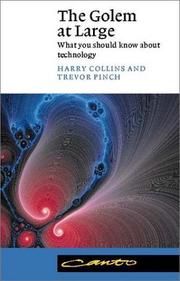
ISBN: 1107126282 1280414456 9786610414451 1139148079 0511169884 051106523X 051105890X 051129705X 051154135X 0511067364 9780511065231 9780511541353 0521012708 9780521012706 Year: 2002 Publisher: Cambridge Cambridge University Press
Abstract | Keywords | Export | Availability | Bookmark
 Loading...
Loading...Choose an application
- Reference Manager
- EndNote
- RefWorks (Direct export to RefWorks)
In the very successful and widely discussed first volume in the Golem series, The Golem: What You Should Know About Science, Harry Collins and Trevor Pinch likened science to the Golem, a creature from Jewish mythology, a powerful creature which, while not evil, can be dangerous because it is clumsy. In this second volume, the authors now consider the Golem of technology. In a series of case studies they demonstrate that the imperfections in technology are related to the uncertainties in science described in the first volume. The case studies cover the role of the Patriot anti-missile missile in the Gulf War, the Challenger space shuttle explosion, tests of nuclear fuel flasks and of anti-misting kerosene as a fuel for airplanes, economic modeling, the question of the origins of oil, analysis of the Chernobyl nuclear disaster, and the contribution of lay expertise to the analysis of treatments for AIDS.
Technology --- Science --- Natural science --- Natural sciences --- Science of science --- Sciences --- Applied science --- Arts, Useful --- Science, Applied --- Useful arts --- Industrial arts --- Material culture --- Social aspects
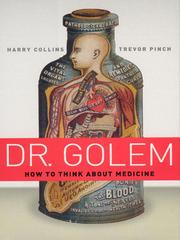
ISBN: 128195943X 9786611959432 0226113698 9780226113692 0226113663 Year: 2005 Publisher: Chicago University of Chicago Press
Abstract | Keywords | Export | Availability | Bookmark
 Loading...
Loading...Choose an application
- Reference Manager
- EndNote
- RefWorks (Direct export to RefWorks)
A creature of Jewish mythology, a golem is an animated being made by man from clay and water who knows neither his own strength nor the extent of his ignorance. Like science and technology, the subjects of Harry Collins and Trevor Pinch's previous volumes, medicine is also a golem, and this Dr. Golem should not be blamed for its mistakes-they are, after all, our mistakes. The problem lies in its well-meaning clumsiness. Dr. Golem explores some of the mysteries and complexities of medicine while untangling the inherent conundrums of scientific research and highlighting its vagaries. Driven by the question of what to do in the face of the fallibility of medicine, Dr. Golem encourages a more inquisitive attitude toward the explanations and accounts offered by medical science. In eight chapters devoted to case studies of modern medicine, Collins and Pinch consider the prevalence of tonsillectomies, the placebo effect and randomized control trials, bogus doctors, CPR, the efficacy of Vitamin C in fighting cancer, chronic fatigue syndrome, AIDS cures, and vaccination. They also examine the tension between the conflicting faces of medicine: medicine as science versus medicine as a source of succor; the interests of an individual versus the interests of a group; and the benefits in the short term versus success rates in the long term. Throughout, Collins and Pinch remind readers that medical science is an economic as well as a social consideration, encapsulated for the authors in the timeless struggle to balance the good health of the many-with vaccinations, for instance-with the good health of a few-those who have adverse reactions to the vaccine. In an age when the deaths of research subjects, the early termination of clinical trials, and the research guidelines for stem cells are front-page news, Dr. Golem is a timely analysis of the limitations of medicine that never loses sight of its strengths.
Medicine, Popular. --- Medicine --- Health Workforce --- Philosophy. --- medicine, medical, sociology, science, scientific research, technology, tonsillectomies, placebo effect, randomized control trials, bogus doctors, cpr, vitamin c, cancer, chronic fatigue syndrome, aids, cures, treatment, vaccination, economics, social, vaccinations, vaccines, health, healthy, philosophy, healthcare, fibromyalgia, diseases, mumps, measles, rubella, cardiopulmonary resuscitation, diagnosis, uncertainty.
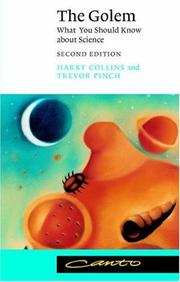
ISBN: 0511001096 9780511001093 9781107295612 1107295610 0521356016 0521645506 1107604656 9780521645508 9781107604650 1139893904 9781139893909 1107414377 9781107414372 1107395402 9781107395404 1107390605 9781107390607 110738768X 1322521379 110738687X 1107299756 9781107387683 Year: 2012 Publisher: Cambridge Cambridge University Press
Abstract | Keywords | Export | Availability | Bookmark
 Loading...
Loading...Choose an application
- Reference Manager
- EndNote
- RefWorks (Direct export to RefWorks)
Harry Collins and Trevor Pinch liken science to the Golem, a creature from Jewish mythology, powerful yet potentially dangerous, a gentle, helpful creature that may yet run amok at any moment. Through a series of intriguing case studies the authors debunk the traditional view that science is the straightforward result of competent theorisation, observation and experimentation. The very well-received first edition generated much debate, reflected in a substantial new Afterword in this second edition, which seeks to place the book in what have become known as 'the science wars'.
Science --- Mathematics --- Physical Sciences & Mathematics --- Elementary Mathematics & Arithmetic --- Natural science --- Natural sciences --- Science of science --- Sciences --- History. --- Social aspects --- History --- Social aspects&delete& --- Philosophy of science --- Social aspects.
| Listing 1 - 10 of 26 | << page >> |
Sort by
|

 Search
Search Feedback
Feedback About UniCat
About UniCat  Help
Help News
News